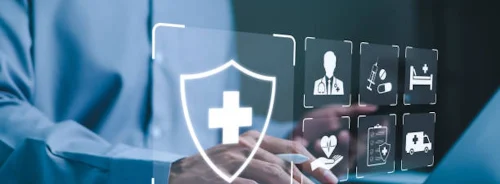ICU Management & Practice, Volume 17 - Issue 2, 2017
How Acute Respiratory Distress Syndrome Changed My Life in a Split Second
Life changed forever when Eileen Rubin was hospitalised with ARDS. After a slow recovery it was time to give something back, and Eileen went on to co-found the ARDS Foundation.
“I can’t breathe. I think I’m dying.” Those were the words I gasped to my mother less than two days after being admitted to the Medical Intensive Care Unit on 2 June 1995. I was thirty-three years old.
Immediately, my mother flew out of my room in search of help. She found my internist and repeated my words verbatim; he responded calmly, “She’s anxious. It’s nothing, I’m sure.” My mother was insistent. She saw the pleading in my eyes; she knew I believed what I said.
Though he was quite reluctant, she convinced my doctor to enter my room. One glance at me and the machines connected to me and chaos ensued. He ordered visitors to leave. A code was called. Staff responded with urgency. And in the waiting room, my loved ones sat anxiously for nearly three hours before any information was forthcoming. It was inconceivable that my last words could have been, “I can’t breathe. I think I’m dying.” And though they were not my final words, those were the last words I spoke for the next eight weeks. However, I was one of the lucky ones. Against the odds, I survived.
ARDS Diagnosed
When Acute Respiratory Distress Syndrome (ARDS) was diagnosed, my internist was so unfamiliar with ARDS, he often was observed doing research. My critical care physician explained this syndrome to my family with difficulty. It was just so hard to understand. Concern grew because doctors seemed very confused about their diagnosis and how to proceed. Often physicians were unavailable and my family had to ask nurses questions; they would not respond, and also declined to call physicians to offer answers or explanations. This left my family lost, confused, concerned and frightened. On a regular basis, my family was asked to sign documents providing consent for tests and procedures, often without fully understanding my condition. Lacking sufficient information to confidently authorise medical care that could result in potential life and death decisions was asking a lot of family. But often consent was necessary.
To complicate matters further, there were so many physicians. Each specialty had its own ‘group.’ Pulmonary had three; Infectious Disease had two. There were doctors from Psychiatry, Rheumatology, Cardiology, Neurology, Haematology, the ENT group, a Thoracic Surgeon and more. Aside from physicians, there were nurses, respiratory therapists, occupational therapists, physical therapists, speech therapists and a biofeedback specialist. The team seemed to include almost everyone. But it did not include my family. And later, it did not include me.
After two weeks, the hospital called a family meeting, attended by three physicians, the head of nursing, a social worker and my family. They alluded to what they believed: that I would never breathe on my own again, that I may have suffered brain damage and that this was a quality-of-life issue. They urged my family to consider removing life support, Doctors were told to do everything within their power to treat me. This meeting, initiated by the hospital, was arranged very quickly. To the contrary, when I asked for a family meeting in my ninth week, it was difficult to organise. Only two doctors showed, but one left early. There was one nurse, my mother and me. My ‘team’ had disappeared.
Although the hospital made it difficult to bring in a consulting specialist from another area hospital, my parents persisted and persevered. The consulting critical care specialist pored over my records, spoke to my doctors, examined me extensively, and reported to my family that my doctors were medically doing everything, but cautioned that he felt my doctors were ‘giving up on me too soon.’ He gave his cell number to my father, telling him to call anytime. That gesture, and this doctor’s reassurance, offered renewed hope that the possibility of my survival existed. To this day, over twenty years later, my father still carries that slip of paper in his wallet.
I spent four weeks in a drug-induced coma. Doctors were certain I remembered nothing. I was certain they were wrong. Once out of the coma, when each physician came to my room, each stated their name and specialty. I already knew who he or she was. More than that, I also knew whether or not I liked that doctor.
Only days later, late at night, when a single room opened on the vent floor, a flurry of activity ensued. Before I realised what was happening, I was being transferred out of ICU. I panicked. I had grown ‘comfortable’ in the MICU. Why was I being moved so late at night. How would people find me? I was confused and frightened. This seemed wrong. I looked at my parents and sister with obvious anxiety. “This is good,” they said. “This means you’re getting better.’” I knew that was not true. Why would they move me from a place of comfort to the unknown? My distress grew. Then they forced my family to leave. I felt completely alone in this unfamiliar place, with unfamiliar staff, unable to communicate, not by writing, not by speaking. I was terrified.
Shortly after, I suffered a serious case of delirium. I remember being unable to sleep, imagining fantasy weaved in with fact, resulting in bizarre, unbelievable stories that seemed so real. I heard everyone around me, mostly talking about me. After a couple of days, I had a neurology consult. But I was angry. I was upset they brought in another doctor. And I was so tired of being completely dependent. I could not move; I could not speak. I needed to exert some control. In this state of mind, I decided not to cooperate with the neurologist. I did not realise the potential consequences. The doctor grew frustrated. He asked my nurse if I cooperated with her. She said, “Sometimes.” And then he raised my left arm above my head and let it drop. He did the same with my right arm. Excited, he announced to my family, “She protected her face!” He explained delirium to my family. He stayed the entire day, performed numerous tests and ruled out other possible causes. Finally at 11:30 pm, he reintroduced the morphine. When the fentanyl, morphine and other drugs were abruptly discontinued without weaning, along with being moved out of ICU, this contributed to my delirium. My neurologist was the first doctor at this hospital who made my family feel part of the team.
Slow Recovery
As I struggled with occupational and physical therapy, fought to wean from the vent, battled constant complications, I realised how many people were involved with my care. It was an army of clinicians but too often, they did not communicate with one another. Doctors offered contradictory information about my medical condition and progress. We expected to receive accurate, consistent information provided by the medical team. That failure created confusion, uncertainty and anxiety.
As a ventilated patient, unable to speak, but full of questions, I often wrote notes to doctors. One day, as I was writing follow up questions, my pulmonary doctor abruptly turned his back and started to walk out. In disbelief, I threw my pad of paper at him; my toss was too weak to make contact. Without noticing, he continued out of my room. I was infuriated to be treated with such disrespect.
In spite of often being treated as “the ARDS patient in room 704” rather than Eileen Rubin, I had many doctors, nurses, therapist and other staff who helped me survive ARDS, sepsis, and many related complications over my nine-week hospitalisation. When I was discharged on 4 August 1995, I walked out, albeit slowly, but on my own. I could not have done that but for my dedicated team of medical professionals, and because of those very people, I knew that one day I would have to give back.
Recovery was a slow, isolating process. People called and visited less, and then, not at all. Everyone around me went back to their daily routine, but my life was forever changed. I could no longer sleep through the night, but during the day I was exhausted. Ten months after my ICU admission, I went back to work part-time. I finally felt, physically and mentally, able to practise law. I fought depression occasionally, but on my two-year ARDS anniversary, I suffered post-traumatic stress disorder (PTSD). It was debilitating. Finding a therapist with experience treating patients suffering PTSD as a result of surviving critical care illness was challenging. Luckily, I found one who helped me out of the darkness.
ARDS Foundation Established
Five years after surviving ARDS, I looked at my children and thought, “If they got ARDS and I did nothing, I could not live with myself.” I was ready to give back. With Paula Blonski, who lost her sister to ARDS, we cofounded ARDS Foundation, a nonprofit organisation, with the primary goal of creating an easy-toread brochure. We wanted families to have more resources than our families had when doctors gave patients a diagnosis of ARDS. We wanted to ensure families received support when their loved one was critically ill, so we we created a website where people could go at any time of the day or night. Immediately, people contacted us from all over the world seeking information, wanting support. Almost everyone told us they never heard of ARDS until they or their loved one was diagnosed.
Sixteen years later, most people still say they never heard of ARDS before this syndrome entered their lives. No one asks to be part of the ARDS Community, but once someone ‘joins’ ARDS Foundation is available for information and support. Paula and I have volunteered our time since our inception in December 2000. We attend the American Thoracic Society (ATS)’s International Conferences every year. I represented ARDS Foundation on ATS’s Public Advisory Roundtable for nine years. Over the years, I have been a member of numerous committees at ATS as well as others related to critical care research. As a patient speaker, I have presented at more than ten ATS sessions as well as at other events. I am currently the Society of Critical Care Medicine’s Discovery Committee Chair of their Patient Engagement Workgroup.
ARDS Foundation has offered three partnership grants for medical research. We have given numerous travel grants. We have partnered to offer nursing scholarships in memory of Paula’s sister, Marybeth Monaghan, to area nurses intending to work with critical care patients after they complete their master’s degree. ARDS Foundation also facilitates many medical research surveys and projects. We are dedicated to providing education, information, awareness and support of Acute Respiratory Distress Syndrome to critical care patients and families and we are dedicated to the clinicians who continue to research these areas.
Conclusion
I have always felt that the addition of the patient and family voice was critically important in all areas of healthcare. Being respected, treated with dignity, included on the team, sharing our stories, expressing priorities related to medical research, working in concert with clinicians, is the ultimate goal. After surviving ARDS, I had one doctor tell me I almost died five times; another doctor said that I am the sickest patient he has ever seen who lived. To be sure, my life changed forever when I was hospitalised with ARDS. Was it a blessing in disguise? I like to think it was.







